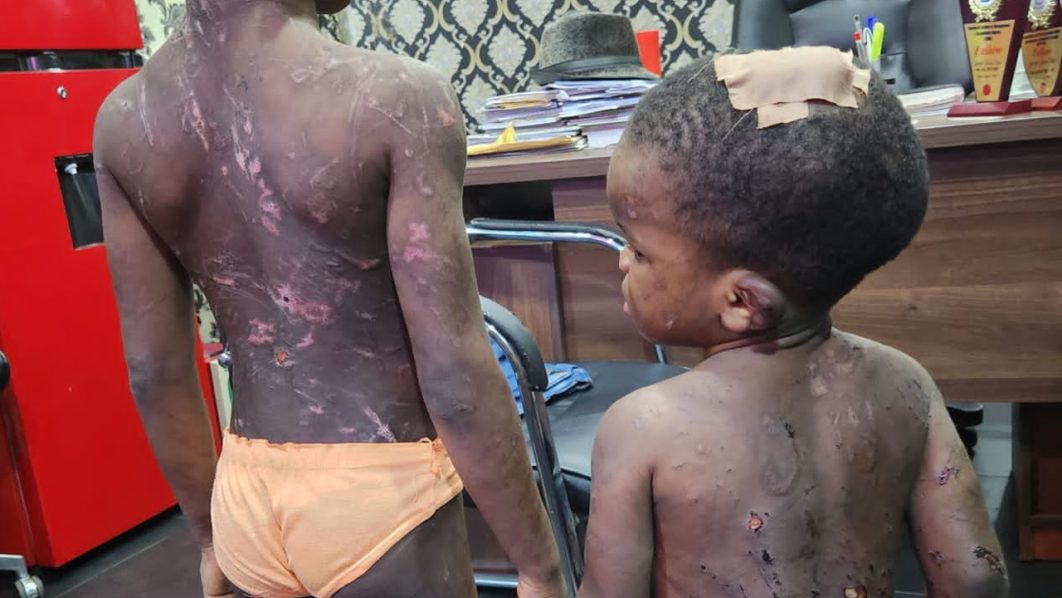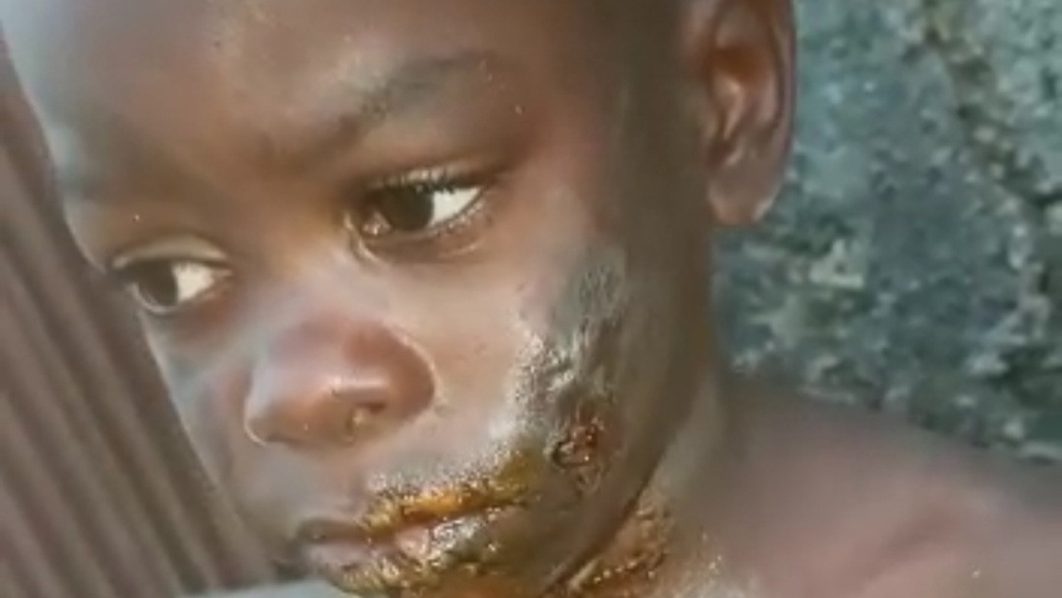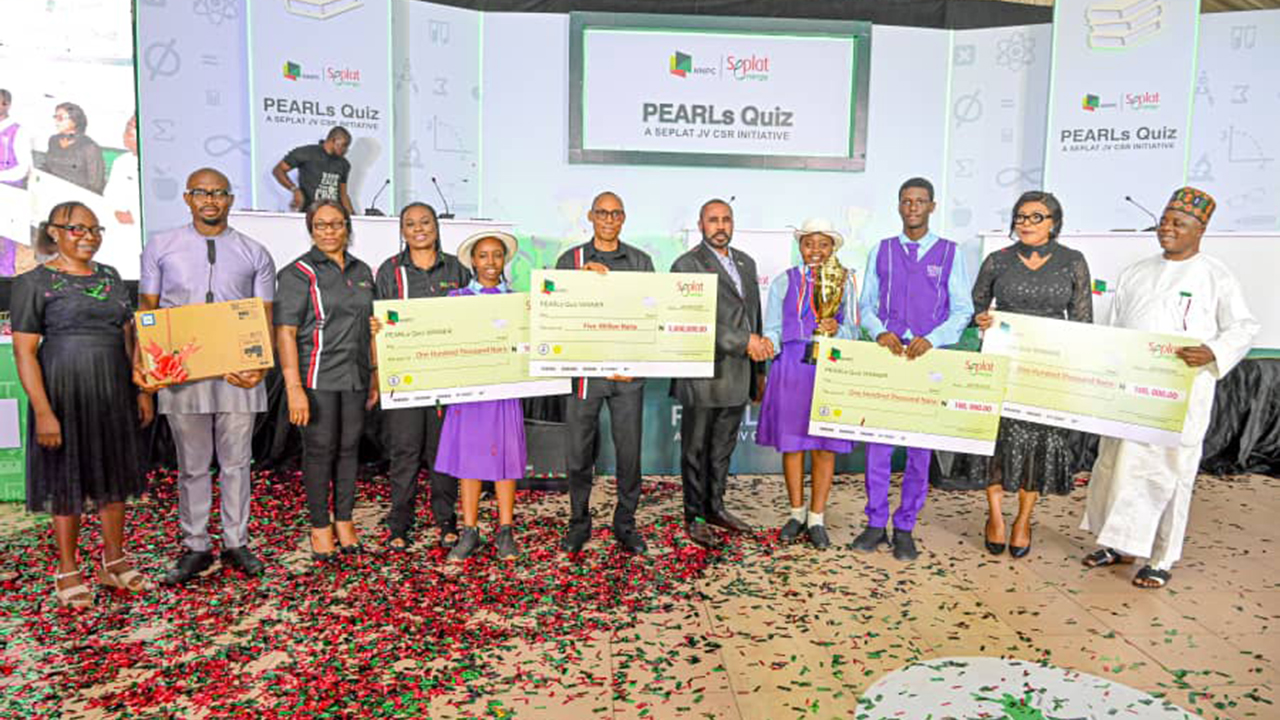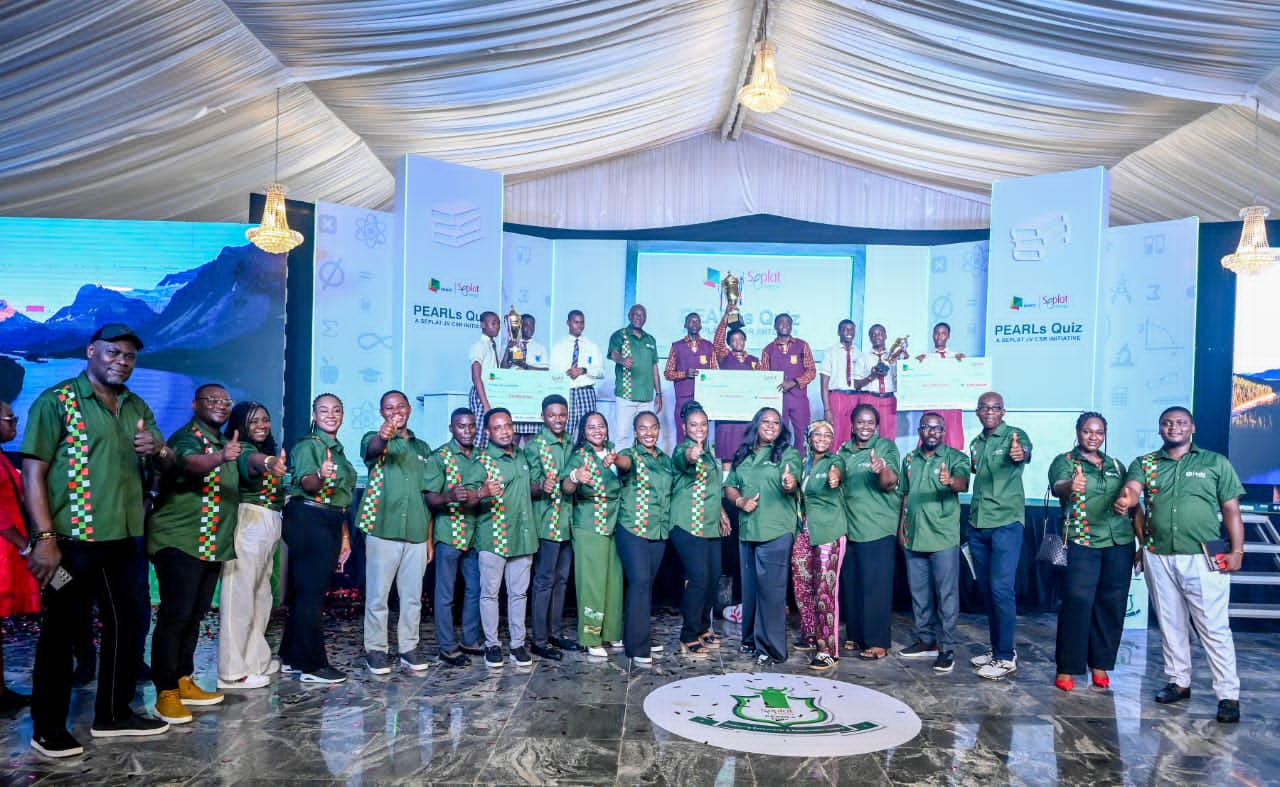 What would cause Miss Busola Oyediran, a mother who laboured to bring to life, two teen sons (aged five and two) to turn around and allegedly dehumanise them alongside her partner, Akebiara Emmanuel, is what Magistrate Bola Osunsanmi of the Samuel Ilori Magistrate Court, Ogba, Ikeja area of Lagos State, will be trying to decipher in the days and months ahead
What would cause Miss Busola Oyediran, a mother who laboured to bring to life, two teen sons (aged five and two) to turn around and allegedly dehumanise them alongside her partner, Akebiara Emmanuel, is what Magistrate Bola Osunsanmi of the Samuel Ilori Magistrate Court, Ogba, Ikeja area of Lagos State, will be trying to decipher in the days and months ahead
Oyediran and her lover, Emmanuel (said to be the kids’ step-father) are facing a four-count charge bordering on the unlawful treatment of a child, unlawful infliction of injuries on a minor, unlawful assault of a child, and felony to cause harm.
The Lagos State government charged the duo to court on January 16, 2022, for physically assaulting her biological children in the Egbeda area of the state, a few weeks after the kids were rescued by the police after neighbours reported that their mother was torturing them endlessly.
Expectedly, the victims presented a very sad spectacle of man’s inhumanity to man, when their violators were paraded by the police. Etched on their innocent bodies, were scars and physical injuries, which spoke volumes of what they have been through.
As the nation battled to come to terms with the assault on the brothers, by their mum and her lover, everyone was, last Thursday, jolted by the arrest of a woman, Mrs. Upev, by the Benue State Police Command, on the suspicion of killing her 10-year-old stepson, Fanen Yange.
A statement signed by the command’s Police Public Relations Officer (PPRO), Catherine Anene, a superintendent of police (SP) said that the incident occurred on January 23, 2023, describing it as a case of culpable homicide, which was reported at E Police Division, Makurdi.
“Preliminary investigation reveals that the deceased, Fanen Yange, 10, of International Market Area, Makurdi, was alleged by his stepmother, Mrs. Upev, to have stolen meat from the pot, and consequently beaten him up during the early hours of the day, but when the victim went to sleep at night, he could not wake up.”
The remains of Fanen, who was confirmed dead by a doctor, were deposited at the Bishop Murray Hospital morgue, in Makurdi, for autopsy, while investigation into his demise continues.
In most cases, the joy that the birth of a newborn brings to their immediate and extended families, as well as society is beyond comprehension. This explains why most parents pull all stops to celebrate their arrivals amid pomp.
But how these bundles of joy quickly become sources of pains, or loathsome creatures that only beastly treatment from their parents, guardians, and caregivers is what many are unable to fathom.
Virtually every week, gory images of abused children grace the media space leaving many to wonder whether humanity is beginning to run out of patience for children. Indeed, at the frequency, with which this is happening, many are wondering whether an end to child abuse is anywhere within sight.
With 20 million of them being out of school in the country, and with no hopes of acquiring formal education, a good number of them roam the streets from sunrise to nightfall, and they pass the night in found spaces. Saved from weather vagaries and sundry vicissitudes, the ones that are fortunate enough to have roofs over their heads are routinely abused by their parents, guardians, master/mistresses, and relatives. This unfortunate scenario makes inevitable, the question, ‘who will save the Nigerian child?’
For context, child abuse refers to any action initiated by a parent, caregiver, guardian, or any other person, in addition to institutions or organisations that are capable of causing physical or emotional harm, risk of serious harm, injury, or even death to a child, whether through deliberate action, or failure to act.
Child abuse, which is multi-faceted includes, exploitation, physical and sexual abuse, neglect, and emotional abuse. Specifically, child maltreatment constitutes neglect and all shades of abuse and exploitation, which result in actual or potential harm to the child’s health, continued existence, development, or dignity in the context of a relationship among others.
Domestic violence or abuse, experts say, contributes in no small way to inequalities that children face in society, including in education, and victims of domestic violence, according to stakeholders have a 13 per cent greater likelihood of not graduating from school.
Without a doubt, incidents of child abuse in the country have remained alarmingly high, sadly many of those who witness these acts of barbarism do not report the infractions to the appropriate authorities.
The indifference shown by society in the face of the unending menace, experts maintain, is not unconnected with the poor and slow domestication of the 1989 United Nations Convention on the Rights of the Child, as well as the 1990 African Charter on the Rights and Welfare of the Child.
In 2003, Nigeria signed into law the Child Rights Act (CRA) to domesticate these international and regional child rights treaties that she is a party to. But the extreme weakness of child protection systems in the country, and the failure to build a child-centered social protection system has made the entire polity challenging, especially with its inherent/broad governance concerns in the country
 So far, the Child Rights Act, according to the Minister of Women Affairs, Mrs. Pauline Tallen, has been adopted by 34 out of the 36 states of the federation.
So far, the Child Rights Act, according to the Minister of Women Affairs, Mrs. Pauline Tallen, has been adopted by 34 out of the 36 states of the federation.
Tallen at the 59th edition of the ministerial media briefing organised by the presidential communications team, in Abuja said: “We have made progress on the domestication of the Child Rights Act 2003. When I assumed office, we had only 12 states that had domesticated the Child Rights Act and without the Act, we cannot achieve our desire of educating female children,” she said.
Despite the nearly 100 per cent adoption of the Act by states, its impact has been very poor and has not inspired hope in the polity.
This was confirmed by the result of a December 2017 public opinion poll conducted by NOIPolls, in partnership with Child Protection Hub Nigeria (CPHub). The poll revealed a very high prevalence (about 92 per cent) of child abuse in the country.
That finding corroborated a report by the United Nations Children’s Fund (UNICEF), which also revealed a high prevalent rate of child abuse in the country, and specified that millions of children in the country suffer some form of physical, emotional, or sexual violence.
NOIPoll’s findings further revealed that half of the respondents (50 per cent) confirmed that they witnessed at least one child being abused within their localities. And this finding was in line with a 2014 Nigeria Violence Against Children (VAC) survey, which was carried out by the National Population Commission (NPC), with support from UNICEF and the United States Centre for Disease Control and Prevention.
That survey revealed that six out of 10 Nigerian children experienced at least one form of violence before they are 18.
Last May, another public opinion poll conducted by NOIPolls revealed mindboggling statistics as 88 per cent of adult Nigerians admitted the prevalence of child abuse, while 51 per cent of adult Nigerians also acknowledged personally seeing children undergo abusive treatments in their localities.
Additionally, the poll result, which also enumerated ethnic-specific types of child abuse explained that 35 per cent of children suffered physical abuse 28 per cent suffered sexual abuse, and 21 per cent suffered abandonment. A higher percentage of adult Nigerians nationwide cited poverty (35 per cent) and parental neglect (32 per cent) as the main causes of child abuse in the country.
Furthermore, the child abuse poll clearly stated that impairing the future of children by abusing their freedoms and rights was tantamount to impairing their development, comprising national development, and the next generation. Hence, the issue of child abuse must be properly dealt with at individual, family, organisational and governmental levels for development and tomorrow’s good.
Catalogue Of Unending Cases Of Domestic Abuse
Among the few cases of child abuse that make it to the media last year, was a 37-year-old woman, Chinelo Udeogu, beating her three-year-old granddaughter to death in Awka, Anambra State capital was arrested for.
The spokesperson of the National Agency for Prohibition of Trafficking in Persons and Other Related Matters (NAPTIP), Okafor Anthony, who made the disclosure, said that the suspect was arrested in a primary school in Awka where she had earlier enrolled the victim and had gone to reclaim the school fees she paid for the victim.
The suspect, upon investigation, admitted beating the three-year-old child days earlier, leaving marks on her body because she defecated in a bucket they used in having their bath at home.
After killing her granddaughter, Udeogu wrapped her remains in a black nylon bag and dumped them in a bush around Hezekiah Dike Crescent Awka.
Late last year, a 13-year-old girl who delivered a baby was rescued by the Ministry of Women and Children’s Welfare, in Anambra State.
The minor’s situation came to light after she was impregnated, by her guardian, Mr. Sunday, who resided in Awka, the state capital. She was detained in a hospital over her inability to pay the hospital bill.
The Akwa Ibom State-born minor, whose biological parents reside in Agulu, Anambra State, revealed that she was violated concurrently with another girl who was at that time seven years older than her.
Miss Chidimma Ikeanyionwu, the spokesperson of the ministry, in confirming the incident to journalists on December 12, 2022, said that the suspect, Mr. Sunday, who had been arrested by the police, would be charged in court soon.
Still, last December, a teenage boy, Chidindu was left with serious burns on his face, neck, and chest at Elezuo Street, Okigwe, Imo State, after he was physically abused by his aunt, in Imo State.
Fellow minors living in the same compound with the victim alleged that the boy was constantly abused by his aunt, whom Chindu also alleged: “threatened to pour burning coals into his eyes and make him go blind.”
Child Abuse As A Growing International Concern
CHILD abuse or child maltreatment is not only a local issue but an international malaise that is raising concerns across borders. The World Health Organisation (WHO) in September, last year, acknowledged the widespread nature of the malaise, just as it recognised the collateral impact that it has on the overall health of the nation.
In its child maltreatment’s key facts, the WHO stated that nearly three in four children – or 300 million children – aged two-four years regularly suffer physical punishment and/or psychological violence at the hands of parents and caregivers, adding that the consequences of child maltreatment include impaired lifelong physical and mental health, stressing that the social and occupational outcomes can ultimately slow a country’s economic and social development.
The WHO also maintained that, “a child who is abused is more likely to abuse others as an adult so that violence is passed down from one generation to the next. It is therefore critical to break this cycle of violence, and in so doing create positive multi-generational impacts.
“Preventing child maltreatment before it starts is possible and requires a multi-sectoral approach,” the body said, adding that, “effective prevention approaches include supporting parents and teaching positive parenting skills, and enhancing laws to prohibit violent punishment.”
Inclement Economic Climate, Poor Parenting, Trigger Hostility Against Children
Most parents want to just love and care for their children in safe, loving homes, within the limit of their financial resources, but stress, tiredness, lack of parenting skills, or family support make the pressures of caring for children overwhelming thereby leading to variants of abuse.
Conversely, the archaic belief by some parents that they have absolute authority over their children and wards, is also fuelling child abuse in many ways.
According to the Zonal Coordinator, South-West Zone, National Human Rights Commission (NHRC), Lucas Koyejo: “Poor parenting skills is one of the factors that contribute to child abuse. A lot of parents are unknowingly abusing their children through negative parenting, neglect, and exposure of children to negative influences like pornography and drugs.
“Child abuse is also escalating due to the primordial belief that a parent, or guardian has absolute authority over a child. This has led to continuous child abuse and indifference by the neighbours and society until some people take it upon themselves to expose these inhuman acts. Moreover, a lot of people are ignorant of the existence of child rights laws and their content. Even law enforcement agencies are not fully aware of the laws that protect children.”
While stressing the need “for sensitisation of the public, law enforcement agents and even schoolchildren on their rights,” he added that “there should be an unrelenting onslaught against child abuse by all stakeholders, which include primarily government agencies responsible for children, law enforcement agencies and the judiciary.”
Clinical psychologist, Elekwachi Chimezie Lekwas, also admits that poor parenting skills and economic climate contribute to child abuse.
According to him, “poor parenting skills, and economic climate contribute to child abuse. Poor parenting skills specifically make parents use violent disciplinary approaches. Economic stress makes parents and guardians transfer aggression to their children. Economic stress affects households and leads to migration, and in the process of migration, a lot of children are exposed to violence.
Impact Of Persistent Child Abuse On Society
Both Koyejo, a human rights law practitioner, and Emediong Akpabio, a human rights and gender activist agree that the consequences of child abuse on society are multi-dimensional hence the compelling need to abolish it.
Said Koyejo: “The consequences of child abuse are multifaceted. It has been found through research that abused children most of the time, grow up to become abusers themselves. Child abuse depending on the form that it takes can impact the education and psychological development of children negatively, which in turn impacts the society at large.”
For Akpabio: “The consequences of child abuse are enormous, but the most damaging is that it makes children grow up with some form of resentment. You dare not mention patriotism where such children are because they would ask, ‘where was the society when these menace festered?’ Living with this feeling can impact a child’s performance except there is thorough healing and recovery.
Also, among the grave consequences, or forms of impact that child abuse has on society is the fact that “the next generation would be more or less held to ransom if we fail to act today. It feels like borrowing for your children to pay, or creating a problem for them to solve. Nations don’t grow like this. I mean, if you look at countries like China or even Israel, what you find is a frenzy for nation-building by their children because they were born free and grateful, and they owe nothing more than being responsible citizens. But in Nigeria, we feel we do not owe the next generation anything.
“For example, the Ministry of Women’s Affairs in addition to its work is supposedly responsible for the protection of children. Year in and year out, we are yet to find one significant achievement (from the ministry), and I am saying, let’s separate the department of child protection from the ministry because it is not working.
“It is unfortunate that the Bill for the Establishment of the Child Protection and Enforcement Agency failed to get the presidential assent citing duplicate functions with the Ministry of Women Affairs at a time that we desperately need an institution to be created specifically for children’s needs.
With the extreme weakness of child protection systems in the country, Akpabio, the Global Co-lead, of Child Solidarity Group, a working group of UNICEF noted that it would be challenging to build a child-centered social protection system.
He stressed: “It would be challenging because the problem is not whether or not we have policies in place to checkmate this menace, but a complete lack of an institutional mechanism to monitor and enforce compliance. For example, we have many states that have domesticated the Child Rights Act, but only a few of them have established special courts to try violators. The strength of the Child Rights Act is in the institution of justice, and that’s a major setback in itself.”
On how the government and society can end this cycle of violence against children with the rate of prosecution and conviction of offenders still very low, the activist said: “I think that we need to also devise another means in addition to conviction. This means naming and shaming offenders; providing incentives to victims so that they speak up and get support, not promises. In most cases, we tend to hide the identity of the offenders, but rather expose the victims. This only leads to a lot of traumatisation and stagnation. We need education on sex and sexuality in schools so that young people can recognise signs of compromise early. We will also need to demand transparency in engaging this process with violators. Information should be made public and accessible to build the confidence of victims.”
Akpabio, who is one of the leads of the Lagos Speak Up Stand Out (SUSO) Peace and Security Activists, added that “barbarism against children still exists because we have not been able to protect women. We cannot talk about protecting children when women are still unsafe in their spaces. These perpetrators come out from homes where they violate women equally and so it only ‘makes sense’ to say that the violence against children is an extension of violence against women.”
Like Koyejo and Akpabio, Lekwas, who is the programme director of the African Network for the Prevention and Protection Against Child Abuse (ANPPACA) shares the view that the consequences of child abuse are damaging to society in many ways.
Said he: “Studies have shown that child abuse affects health. It specifically leads to poor mental and physical health, and adverse childhood experiences. All these costs also affect our Gross Domestic Product (GDP).
“Many parents do not understand the basics of the rights of children even though there are laws that have not been made known to a lot of people. This is because awareness creation is poor. While these laws are increasingly being domesticated by states, society is still not well sensitised, and provisions are made known to the general populace. There is a view that says that with the increasing passage of laws, more hidden violence against children can be tackled.
“Another critical point is that laws are meant to state what consequences an individual will face if they break them. They are also supposed to deter people from abusing their wards, or children. However, for obvious reasons, when the parents abuse a child culturally and socially, it’s difficult to imprison the parents because actions against the parents will also affect the child because there is no proper foster care structures in place to prevent the continued abuse.”
Lekwas while deploring poor implementation of the Child Rights Act said that Section 207 of the Child Rights Act provides for a specialised police children’s unit, which is supposed to work towards preventing children from joining criminality. This unit is currently not in place in many police formations across Nigeria. Furthermore, the family court is also supposed to be set up, but they are absent in many states that have domesticated the Child Right Act. So, you find out that where the Child Rights Act has been adopted, it’s not optimally functional.
“However, most critically child abuse is no longer seen as just a crime now, but a public health issue, which should be tackled using public health approaches of collecting epidemiological data; studying the prevalence; introducing evidence-based prevention programme, and studying the rate of reporting and prevention among others… This requires investment on the part of the government.”
How To End Child Abuse
Achieving the Sustainable Development Goal (SDG) of ending all forms of violence against children by 2030 remains a forlorn hope, especially with the difficulty in setting up all the needed structures that would make for the effective implementation of the Child Rights Act.
Since family is the nucleus of society, experts insist that it is important for parents (both biological and foster), and guardians to imbibe the habit of raising children in safe, and stable homes since these kids are likely going to repeat habits they imbibed growing up in their homes.
Lekwas, on his part said that the “government should set up the judiciary to be more child-friendly by setting up effective family courts. They should invest in public health approach to preventing child abuse. They should be mindful of collecting child abuse prevention data. They should invest in awareness creation on the rights of the child.
“The best way to protect children from abuse is at the family level; the family is supposed to be the safest place for the child. Alas, this is not the situation,” Lekwas added.






